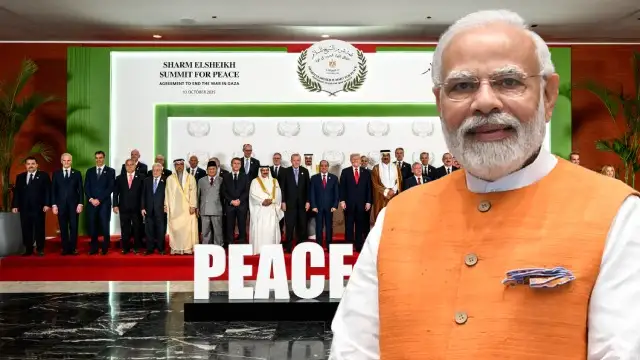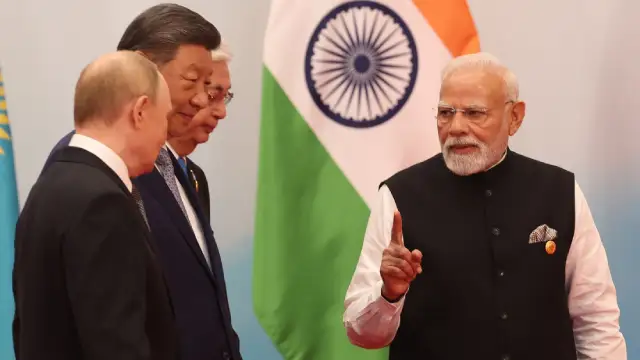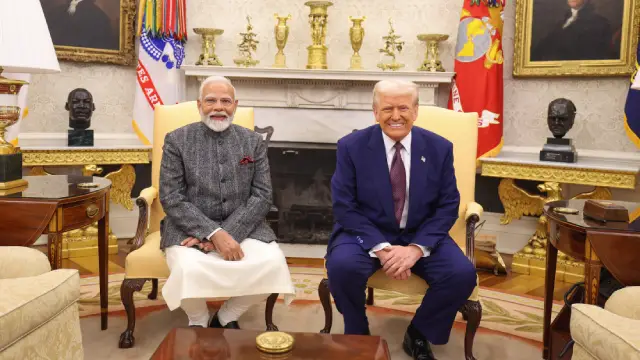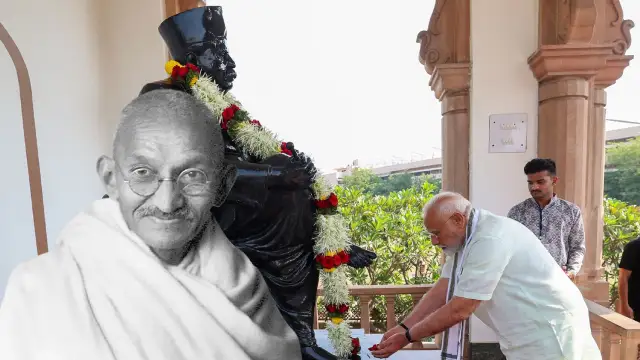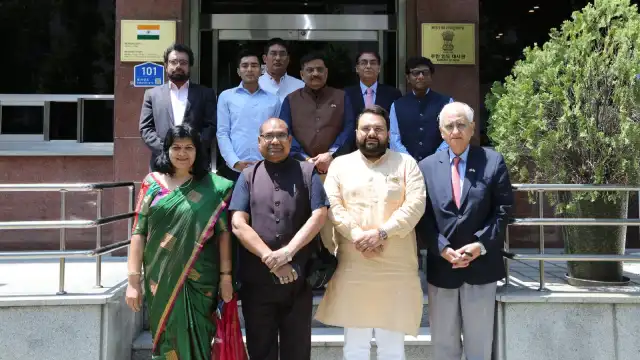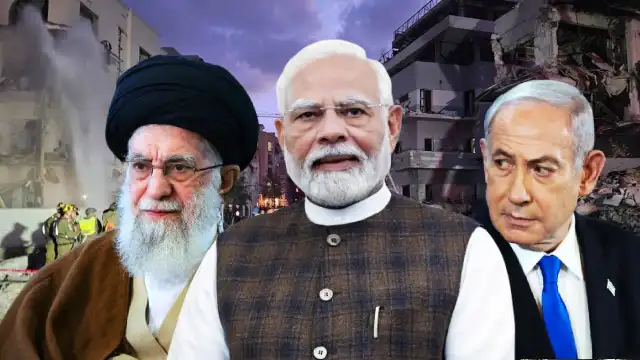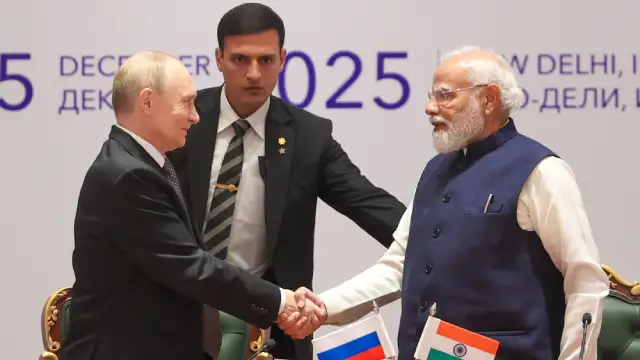When Prime Minister Narendra Modi decided to send a junior minister to the crucial Gaza peace summit in Sharm el-Sheikh after Egyptian President Abdel Fatah Al-Sisi invited him through his ambassador to India last weekend, it raised several eyebrows. Why did Mr Modi opt not to participate in the meet hosted under US President Donald Trump’s aegis when he had been praising him and Benjamin Netanyahu, the Israeli prime minister, for days at a stretch for the Gaza peace deal?
This question became important as Mr Modi also praised the hostage exchange programme between the Israeli occupation and the Palestinian resistance. However, as the events at the Sharm el-Sheikh unfolded before the world, it became clear what Mr Modi had been evading.
We welcome the agreement on the first phase of President Trump's peace plan. This is also a reflection of the strong leadership of PM Netanyahu.
— Narendra Modi (@narendramodi) October 9, 2025
We hope the release of hostages and enhanced humanitarian assistance to the people of Gaza will bring respite to them and pave the way…
Behind this evasion, Mr Modi isn’t merely driven by geopolitical reasons but also by domestic political compulsions, especially before the upcoming Bihar Assembly elections.
Bihar keeps Modi away from Gaza peace summit at Sharm el-Sheikh
For Mr Modi, who has been praising Mr Trump and Mr Netanyahu for the Gaza peace deal, the summit at Sharm el-Sheikh would have been a perfect place to sing paens to the US president. However, it could have been a major nightmare for him as well, something he has been trying to avoid for a long time.
The Sharm el-Sheikh didn’t host a summit to finalise the Gaza peace deal or to secure the Palestinian lives from Israel.
Before the Sharm el-Sheikh summit, Mr Trump visited Israel, addressed the Knesset and reaffirmed the US’s long-term support for Mr Netanyahu’s war machinery. This indicates that the Gaza peace deal is hanging by a thin thread.
The Sharm el-Sheikh summit, therefore, was merely a formal gathering by Mr Trump’s allies to praise him and console him for missing the Nobel Peace Prize. That’s where Mr Modi could have faced an ignominious situation during the meeting on Gaza at Sharm el-Sheikh.
At the summit, several world leaders praised Mr Trump as a harbinger of peace. Pakistan’s Prime Minister Shehbaz Sharif, who attended the summit, didn’t press the brakes while heaping praises on Mr Trump.
In doing so, he highlighted how Mr Trump played a crucial role in brokering a ceasefire between India and Pakistan during their border skirmish in May. The skirmish, codenamed “Operation Sindoor” in India, is an election trump card for Mr Modi and his far-right Bharatiya Janata Party (BJP).
Pakistani Prime Minister @CMShehbaz has confirmed that @realDonaldTrump had played a role in brokering a ceasefire between India and Pakistan during the May 2025 border skirmish. #Modi skipped #SharmElSheikh to avoid #ShehbazSharif causing ignominy. pic.twitter.com/V76IP7NW9V
— East Post (@EastPostIn) October 14, 2025
Mr Modi’s BJP has been claiming that India has punished Pakistan for the Pahalgam terrorist attack, which took place on April 22nd, through targeted attacks inside Pakistani territory.
The BJP and Mr Modi have evaded responding directly to Mr Trump’s claims that he brokered a ceasefire between India and Pakistan.
While Mr Modi and his government have categorically denied the involvement of any third party in the ceasefire dialogue, there has been no official rejection of Mr Trump’s claims.
This evasive approach of the prime minister has caught him off guard, and the Opposition has trained its guns on his government.
Leader of the Opposition in the Lok Sabha—the lower house of the Indian Parliament—Rahul Gandhi had challenged Mr Modi to negate Mr Trump’s claims by calling them a lie. Mr Modi even avoided doing that.
While the BJP is sharpening its swords for the upcoming Bihar Assembly elections, a state that it has been ruling in coalition for over 13 years, Operation Sindoor remains a strong weapon in its arsenal.
As jingoism and xenophobia help the Hindutva camp, represented by the BJP, to sweep elections, Mr Modi is expected to use them in abundance during the election campaign.
However, Mr Modi’s presence at the Gaza peace summit in Sharm el-Sheikh, where the Pakistani prime minister would hail the US president for stopping a nuclear catastrophe between India and Pakistan, could’ve been a political disaster.
The Opposition could’ve used the optics to prove that Mr Modi traded India’s sovereignty. The prime minister couldn’t have dared to condemn the US and face an ignominious situation.
The presence of a junior Indian minister means very little focus on the event by the country’s state-affiliated mainstream media.
This insulates the BJP from further risks in the murky waters of Bihar’s complex politics.
Due to domestic political compulsions, Mr Modi followed the path shown by Mr Netanyahu to evade embarrassment.
While for Mr Netanyahu, the presence of Mr Sharif, Türkiye’s President Recep Tayyip Erdoǧan and Qatar’s Emir Tamim bin Hamad Al Thani and others would’ve been problematic, given the fragile state of his coalition, for Mr Modi, the confirmation of US involvement in India’s ceasefire would’ve opened a Pandora’s box.
Geopolitical compulsions made Modi skip Gaza meet at Sharm el-Sheikh
Only domestic political compulsions aren’t enough to keep Mr Modi away from the Gaza meet at Sharm el-Sheikh. There were geopolitical compulsions as well.
The US president has not appreciated Mr Modi’s frantic attempts to woo him and his government by hailing the Gaza peace deal.
We welcome the release of all hostages after over two years of captivity. Their freedom stands as a tribute to the courage of their families, the unwavering peace efforts of President Trump and the strong resolve of Prime Minister Netanyahu. We support President Trump’s sincere…
— Narendra Modi (@narendramodi) October 13, 2025
Washington has not moved an inch towards reconciliation with New Delhi after Mr Trump imposed a 50% tariff regime on imports from India.
This has been a major shock for Mr Modi and the Hindutva camp, as they apparently expected the white supremacist leader to throw his support for them.
Mr Modi wants to invite both Mr Trump and Mr Netanyahu to India this year.
In view of the tariffs and Russian President Vladimir Putin’s visit in December, it’s unlikely that Mr Trump will visit the country.
In this scenario, there was no reason for Mr Modi to attend the Gaza talks in Sharm el-Sheikh and face Mr Trump and Mr Sharif.
Moreover, India has remained nonchalant regarding the Gaza genocide.
Though Mr Modi had signed the Tianjin Declaration, which condemned Israeli aggression on Gaza, his government has neither flagged the massacre of Palestinians as a genocide nor has it made any efforts to broker peace between the two sides.
Despite prescribing the two-state solution to end the Gaza genocide while meeting Palestinian Authority President Mahmoud Abbas, Mr Modi never reiterated the demand when he spoke to Israelis.
Rather, Mr Modi’s government has used Israel’s “anti-terror” lens to view Gaza and label the genocide as Israel’s fight against terrorism.
Called my friend, Prime Minister Netanyahu, to congratulate him on the progress made under President Trump’s Gaza peace plan. We welcome the agreement on the release of hostages and enhanced humanitarian assistance to the people of Gaza. Reaffirmed that terrorism in any form or…
— Narendra Modi (@narendramodi) October 9, 2025
Due to this reason, Mr Modi’s government had sent aid twice in two years to the besieged enclave.
To exhibit support for the Israelis, Mr Modi, while hailing the Gaza peace deal pushed by Mr Trump, has called the Palestinians living in the Strip “people of Gaza” and not by their nationality.
Spoke to my friend, President Trump and congratulated him on the success of the historic Gaza peace plan. Also reviewed the good progress achieved in trade negotiations. Agreed to stay in close touch over the coming weeks. @POTUS @realDonaldTrump
— Narendra Modi (@narendramodi) October 9, 2025
At the same time, he has hailed Mr Netanyahu’s leadership, praising the Israeli leader who faces massive domestic discontent.
Thus, for Mr Modi, whose ruling BJP has vociferously supported the genocide and used the optics from the Gaza Strip to stoke Islamophobia in India, attending the Sharm el-Sheikh summit would have been problematic.
Neither Mr Modi could have reiterate India’s official stance—supporting the two-state solution to permanently resolve the conflict in West Asia—at such a platform, risking its close ties with Israel, nor could India make its Arab allies unhappy.
To evade these complexities, Mr Modi not only evaded the meeting on Gaza at Sharm el-Sheikh himself, but also didn’t send his External Affairs Minister S Jaishankar to avoid creating controversies.
Mr Modi has given three major indications by avoiding the meeting on Gaza at Sharm el-Sheikh.
Firstly, he has shown that India won’t accept Mr Trump’s claims on brokering the ceasefire during Operation Sindoor.
Secondly, he has also indicated that despite all the hiccups, India will continue in its efforts to woo the US.
Finally, his government will continue its pursuit of strengthening India-Israel ties even at the cost of discarding New Delhi’s policy of supporting an independent state of Palestine.
What remains to be seen now is whether Mr Modi’s foreign policy gambits can help his BJP win the Bihar Assembly elections and also help secure a trade deal with the US, significantly reducing the tariff barrier.
If neither of these happens, then his federal government would face stiff challenges in the long run.
Join our channels on Telegram and WhatsApp to receive geopolitical updates, videos and more.

